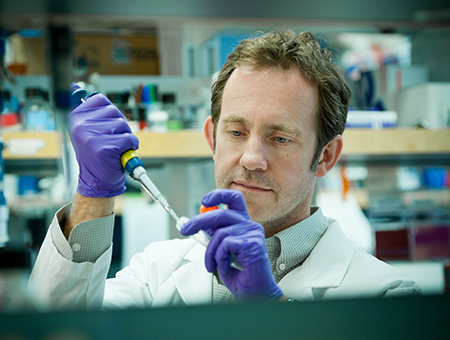When Gavin Vadocz was three months old, his body was beset by twitching and rapid eye movements. After being diagnosed with “unknown cause epilepsy,” his mother prepared to administer a regimen of pills for the rest of Gavin’s childhood.
Then came some welcome news. A genetic test had identified the source of his seizures, a rare deficiency of a protein called GLUT1. The treatment is fairly simple: a high-fat diet. So instead of pills, he is now eating macadamia nuts and avocado.
“There isn’t a cure, but there is something I can do that works,” his mother, Jennifer Vadocz, says.
Such a definitive diagnosis, unfortunately, eludes about half of the children with epilepsy. Children and doctors struggle to combat epilepsy of unknown cause with multiple medications and expensive testing, usually lasting for several years.
Now, with help from a $100,000 gift from the Alva Foundation, an interdisciplinary group in the Faculty of Medicine has embarked on a three-year strategy to identify genetic mutations that cause epilepsy.
With sophisticated sequencing technology in the Djavad Mowafaghian Centre for Brain Health and expertise in genetics and genome informatics, UBC researchers are analyzing portions of the genomes of children under age five with epilepsy of unknown cause. Genetic mutations identified can reveal biochemical abnormalities – and possible treatments.
“In genetic medicine, sometimes called precision medicine or personalized medicine, our goals are to promote rapid innovation and provide accurate, clinically meaningful results,” says Matthew Farrer, the Canada Excellence Research Chair in Neurogenetics and Translational Neuroscience at UBC and the Dr. Donald Rix BC Leadership Chair in Genetic Medicine. “We perform the genome sequencing within a week, so for some patients and families our approach is much faster and lower in heartache than the current standard of care.”
Successes emerged in the first months of testing. Of the 50 children whose genomes were sequenced by June, the cause of epilepsy was identified in 13, and the results pointed to changes in treatment for eight of them. In one child, a mutation put her at high risk of liver damage, and by changing the drug being used to treat her seizures, her doctor was able to spare that organ from harm.
“This project fit nicely with our criteria to fund research into risk factors in early childhood development,” says Graham Hallward, President of the Alva Foundation. “But research can be a journey into the unknown. So we are very pleased with the early patient results, and hope this genetic testing can become standard practice to treat all children with epilepsy.”
The UBC study will incorporate an economic analysis, which could convince health policy-makers of the need for more routine genetic sequencing of children with epilepsy, reducing the risk of potential long-term brain damage from seizures.
“Seizures are bad for the developing brain,” says Mary Connolly, Head of the Division of Pediatric Neurology and Director of the Epilepsy Program at BC Children’s Hospital. “Some children outgrow them and bounce back, but others can develop autism and intellectual impairment. Genetic sequencing won’t help every child, but it is a remarkable tool that will help us quickly diagnose hundreds of children every year, stop the seizures, and let these kids be kids.”

